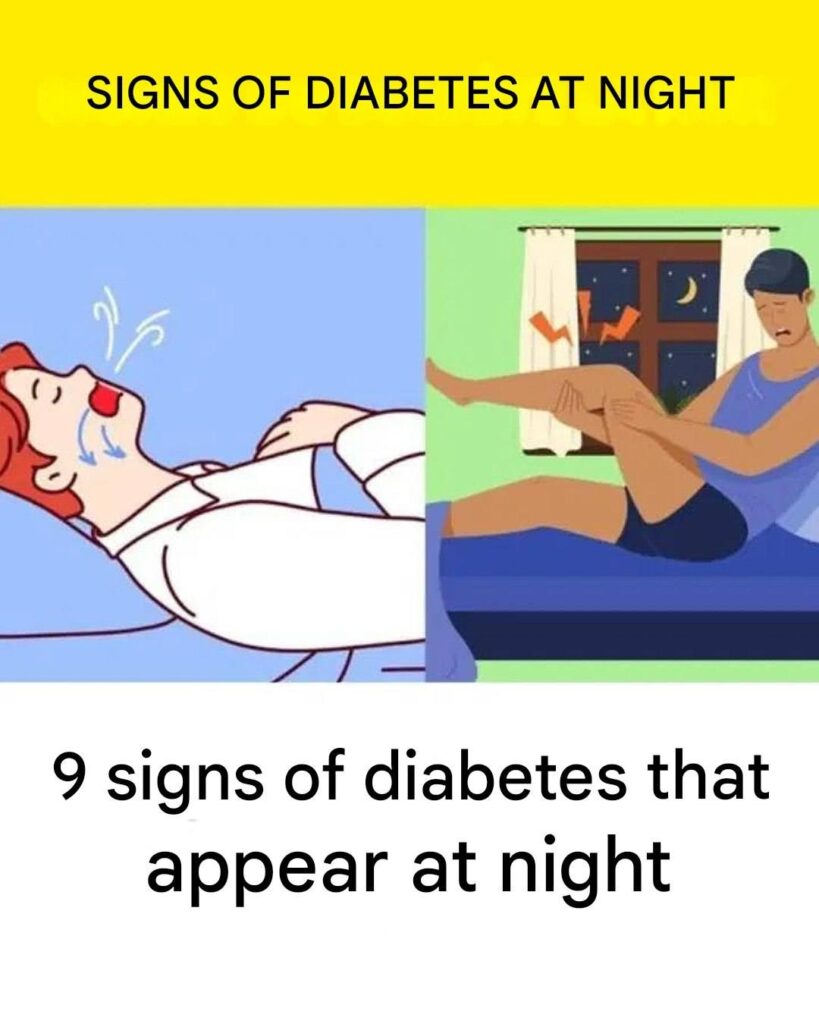
Home 9 Signs of Diabetes That Appear at Night — What You Should Know
9 Signs of Diabetes That Appear at Night — What You Should Know
You lie down to rest.
The house goes quiet.
But instead of drifting off, your body sends subtle signals:
Waking up parched
Sweating unexpectedly
Needing to pee again and again
These nighttime disruptions might seem minor — just part of aging or stress — but they could be early signs of diabetes.
Type 2 diabetes often develops slowly, with symptoms so gradual that many people don’t notice them… until they begin affecting sleep.
And yes — some of the clearest clues show up after dark.
Let’s explore the 9 most common nighttime signs of blood sugar imbalance — so you can recognize them early, respond wisely, and protect your long-term health.
Because real wellness isn’t about waiting for a crisis.
It’s about listening — even in the silence of night.
Why Diabetes Symptoms Show Up at Night
Your body doesn’t stop working when you sleep.
In fact, nighttime is when key metabolic processes unfold — including how your body manages glucose (sugar) and insulin.
When insulin resistance or pancreatic dysfunction begins (as in prediabetes or type 2 diabetes), it can disrupt these nighttime functions — leading to noticeable symptoms.
Spotting them early increases your chances of reversing prediabetes or managing diabetes before complications arise.
9 Nighttime Signs Linked to Diabetes
1. Frequent Urination (Nocturia)
Waking up two or more times per night to pee
Caused by high blood sugar pulling fluid from tissues into the bloodstream → kidneys work overtime to filter it out
Common in both type 1 and type 2 diabetes
Not normal after age 60 if happening nightly
2. Extreme Thirst (Nocturnal Polydipsia)
Waking up with a dry mouth or intense need for water
Your body’s response to fluid loss from frequent urination
Often follows bathroom trips — creating a cycle of thirst → drink → pee
3. Night Sweats (Unexplained)
Drenching sweats not caused by room temperature or menopause
Can be due to nocturnal hypoglycemia (low blood sugar), especially in people taking insulin or certain diabetes medications
⚠️ If you have diabetes and wake up sweaty, shaky, or confused — check your blood sugar
4. Blurred Vision Upon Waking
Temporary blurriness that clears after minutes or hours
High blood sugar causes fluid shifts in the lens of the eye
✅ Resolves once glucose levels stabilize — but recurring episodes need evaluation
5. Increased Hunger Before Bed or At Night
Feeling ravenous despite eating enough
Insulin resistance prevents cells from absorbing glucose → brain thinks you’re starving
This “starvation in the midst of plenty” drives late-night cravings
6. Fatigue That Doesn’t Improve With Sleep
Falling asleep easily but waking unrefreshed
Poor glucose control disrupts deep sleep stages and oxygen delivery
Chronic fatigue is one of the top early complaints in undiagnosed diabetes
7. Leg Cramps or Tingling (Early Neuropathy)
Leg cramps, numbness, or “pins and needles” at night
Early sign of diabetic neuropathy — nerve damage from prolonged high blood sugar
Often starts symmetrically in feet (“stocking distribution”)
8. Recurrent Infections (Like Yeast or UTIs)
Frequent vaginal yeast infections or urinary tract infections
High glucose in urine feeds bacteria and fungi
More common in women with undiagnosed or poorly controlled diabetes
Notice a pattern? It may be metabolic.
9. Snoring or Sleep Apnea Symptoms
Loud snoring, gasping, or daytime sleepiness
Strong link between obstructive sleep apnea (OSA) and insulin resistance
OSA worsens blood sugar control — and vice versa
The American Diabetes Association recommends screening for OSA in patients with type 2 diabetes
✅ Who Should Be Extra Cautious?
✅ Overweight or obesity
Fat tissue increases insulin resistance
✅ Family history of diabetes
Genetic predisposition plays a role
✅ Age over 45
Risk increases with age
✅ History of gestational diabetes
50% chance of developing type 2 within 10 years
✅ Sedentary lifestyle
Exercise improves insulin sensitivity
Prediabetes affects over 1 in 3 adults — most don’t know they have it.
✅ What You Can Do Tonight
Don’t panic — take action.
✅ Track your symptoms
Use a journal or notes app to log nighttime patterns
✅ Limit carbs before bed
Especially sugary or refined foods
✅ Avoid large meals within 2–3 hours of bedtime
Helps stabilize blood sugar overnight
✅ Stay hydrated — but reduce fluids 1 hour before sleep
Minimizes nocturia
✅ Talk to your doctor
Ask for a fasting blood glucose or HbA1c test
HbA1c measures average blood sugar over 2–3 months — a powerful early indicator.
❌ Debunking the Myths
❌ “Only overweight people get diabetes”
False — thin people can develop insulin resistance too
❌ “If I feel fine, I don’t need testing”
Dangerous myth — diabetes is often symptomless early on
❌ “Drinking water cures high blood sugar”
No — hydration helps, but doesn’t replace medical care
❌ “Natural supplements reverse diabetes”
Misleading — lifestyle change works best; never replace meds without guidance
When to See a Doctor
See your healthcare provider if:
You regularly wake up to pee or drink water
You experience night sweats without explanation
You have persistent fatigue despite good sleep
You notice tingling in hands or feet
A simple blood test can detect prediabetes or diabetes — and early intervention can prevent progression.
Final Thoughts
You don’t need to suffer through another restless night.
That dry mouth?
That trip to the bathroom at 3 a.m.?
They’re not just annoyances.
They might be whispers from your body — asking for attention.
So next time you’re lying awake…
don’t dismiss it.
Listen.
Act.
Ask questions.
Because real health isn’t about perfect numbers.
It’s about catching the small signs — before they become big problems.
And that kind of awareness?
It starts with one quiet moment — and one brave decision to care.